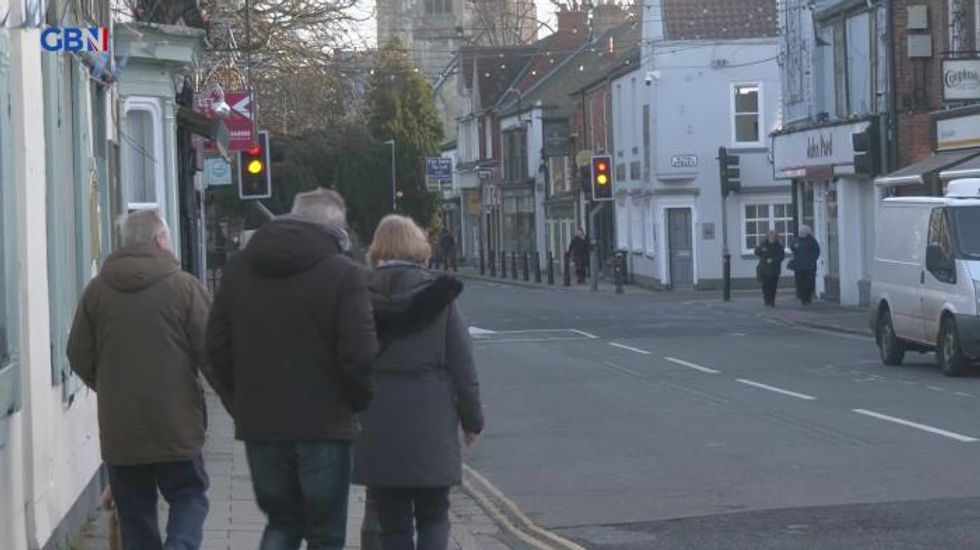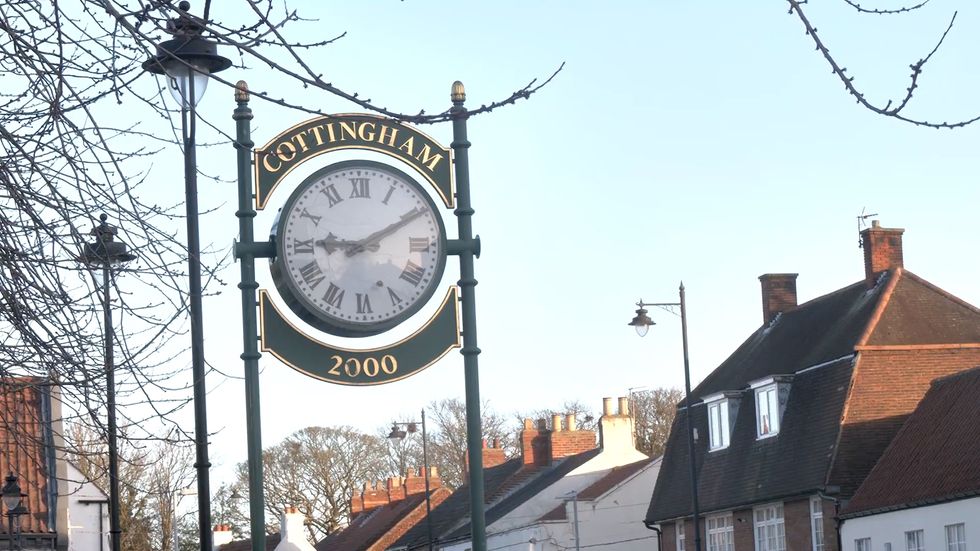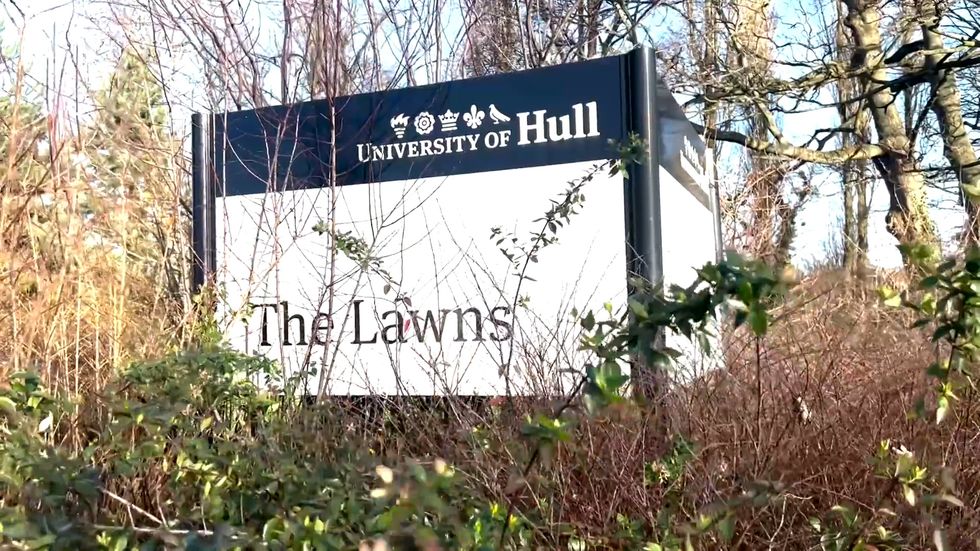East Yorkshire village of Cottingham successfully campaigned against proposed plans
Don't Miss
Most Read
Trending on GB News
A protest is taking place in Hull today over concerns that unsuitable sites are being used by the government to house asylum seekers.
It comes following a successful campaign by residents in Cottingham to oppose the sale of former university halls of residence to the Home Office.
Locals in the East Yorkshire village were successful in their campaign to prevent the University of Hull sites, known as The Lawns and Ferens Hall, being sold to the Home Office to house more than 1,000 asylum seekers.
The university made the decision not to sell the land to the government, after the proposal was met with much uproar amongst the local community.
Locals felt that the village was not an appropriate place to home such a larger number of asylum seekers and held a public meeting and a protest to highlight their resistance to the plans.
GB News
Louise Akester had a large part to play in the campaign and told GB News: “The reason that a lot of people were perhaps afraid to speak out about it is for the fear that they were branded racist or swaying one way or another.
“That wasn’t it at all. It’s literally for a small community this size – it just couldn’t cater for that many people.
“1,100 people in a village this size – it just doesn’t make sense.”
In response to the scrapped proposals, Cottingham residents have told GB News of their relief that the sale of the land to house asylum seekers is no longer going ahead.
The concerns come after the current use of former University of Hull student residence which is already being used to house up to 200 people awaiting a decision on their asylum applications
Thwaite Hall in Cottingham is now under private ownership which is already being used to house people awaiting a decision on their asylum applications.
But it emerged in June last year that as many as 30 male asylum seekers who were staying in the accommodation left and never returned.
There were fears that this could happen on a larger scale in Cottingham, should more land be sold, as asylum seekers are not detained at the centre, but under certain conditions which mean they should notify authorities if they move or find their own accommodation.
Speaking to GB News, resident George Washlin said: “There’s 20,000 people in Cottingham and they were going to put 1,100 single men in Cottingham. Ridiculous.”
Another man told GB News: “You feel safe [in Cottingham], you can walk out. I don’t think I’d feel safe if it was full of asylum seekers.”
It was said by another resident: “We’re a village with finite resources, and we’re not a dumping ground for the Home Office.”
One woman added: “With a doctor’s surgery and dentist and other different things, we wouldn’t be able to cope.”
Local leaders feel more should be done by the government so other areas like Cottingham do not face the same fate.
Independent Cottingham North Councillor for the East Riding of Yorkshire, Ros Jump, said: “It’s a scattergun approach which doesn’t work because they’re [the Home Office] aren’t looking at the sites before they select them to see, is the infrastructure there? Can the locality take the impact?
“They’re just saying oh there’s a spare property there, we’ll use that.
“They’ve got to stop that and have got to put a pause to it.
“Why don’t they hire cruise ships that aren’t being used?
During 2022, figures from the Ministry of Defence show that 45,756 made small boat crossings from France to England - the highest total since the data was first collected in 2018.
In December Prime Minister Rishi Sunak announced a range of measures intended to tackle the issue. The High Court also ruled that the government’s intention to deport people seeking asylum in the UK to Rwanda was lawful.
Haltemprice and Howden Conservative MP for the area of Cottingham, David Davis, told GB News that asylum seekers need to be stopped before they get to Britain.
“The real answer is not to look for other places to put them [asylum seekers], the real answer is to stop the flow.
“If it carries on growing as it has, we could be talking about 1,000 a week. That means finding a new Lawns [University of Hull accommodation] every week somewhere in the country.
“Well that’s just not going to happen. It’s really just a policy sticking plaster – the trouble was from Cottingham’s point of view, although it be a temporary sticking plaster for the government, it would be a permanent issue for Cottingham.”
In a statement sent to GB News, the University of Hull set out that it will not sell or rent The Lawns and Ferens Hall property to the Home Office or to any other purchaser who advises that their intention is to use the site for accommodation for the Home Office.
A spokesman said: “We would like to reassure everyone that the University will not sell or rent The Lawns and Ferens Hall property to the Home Office or to any other organisation who advises that their intention is to use the site for accommodation for the Home Office. This decision has been taken and we will not go back on our commitment.
“We have listened closely to the feedback from the community and, following constructive conversations with members of the community, regional MPs, the Police, the NHS, local authorities and other key stakeholders, we have taken this decision based on the concerns which have been raised.
“While the University still intends to sell the land, we will continue to engage with key stakeholders in the region to determine a financially viable alternative for The Lawns and Ferens Hall that reflects the communities’ priorities.
The Home Office agree that the The Lawns and Ferens Hall sites in Cottingham are not suitable for this purpose, as it also today confirmed that it will not be taking forward any proposals to procure the Lawns and Ferens Hall for accommodation.
A government spokesman said: “The number of people arriving in the UK who require accommodation has reached record levels due to the unacceptable rise in small boat arrivals and our commitment to accommodate those from Afghanistan.
“Every day the hotel bill for accommodating more than 45,500 asylum seekers and over 9,200 Afghans is £6.8 million, and the British public rightly expect that we reduce these costs as quickly as possible.
“We continue to look at all available options to source appropriate and cost-effective temporary accommodation.”











